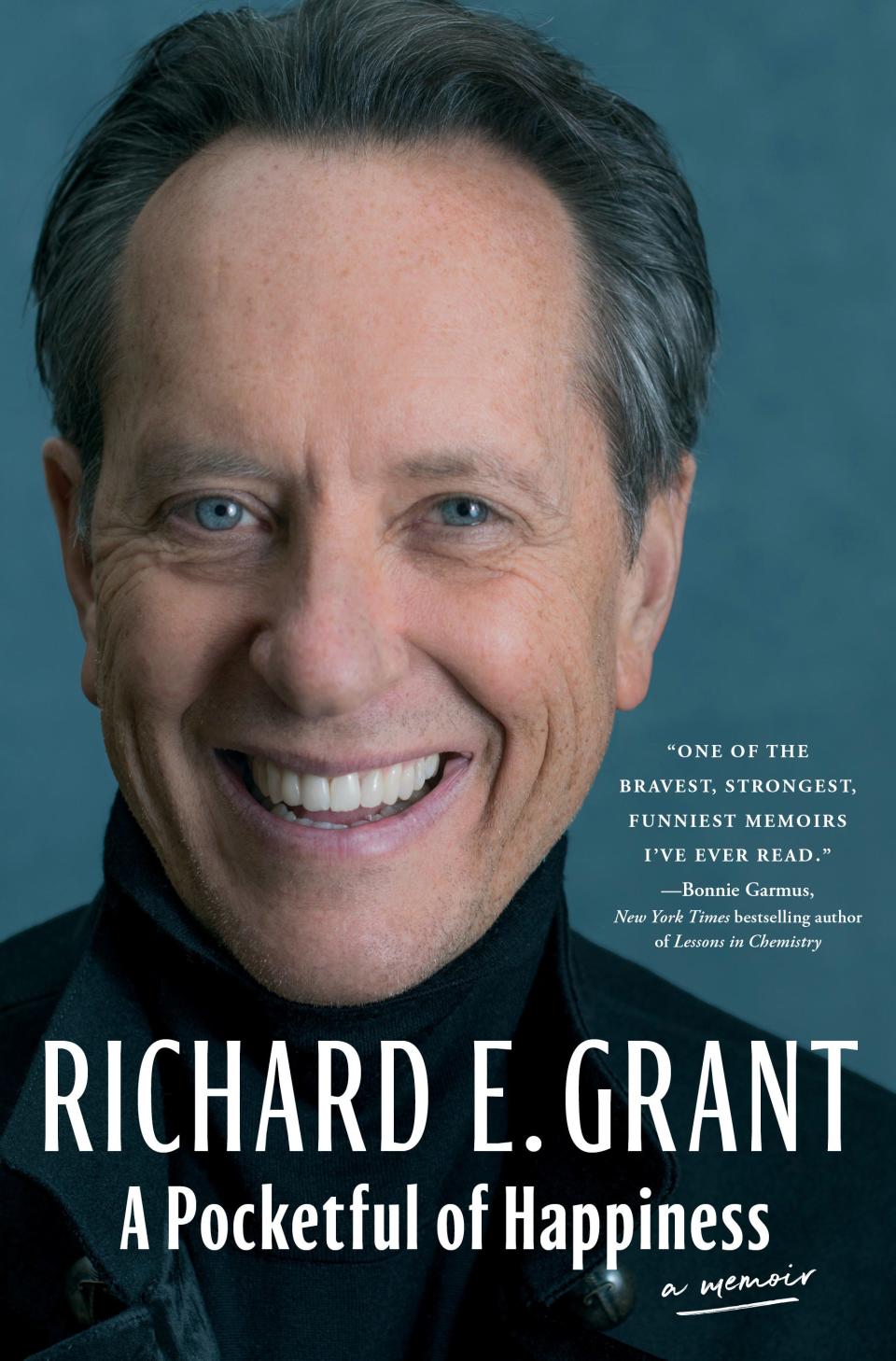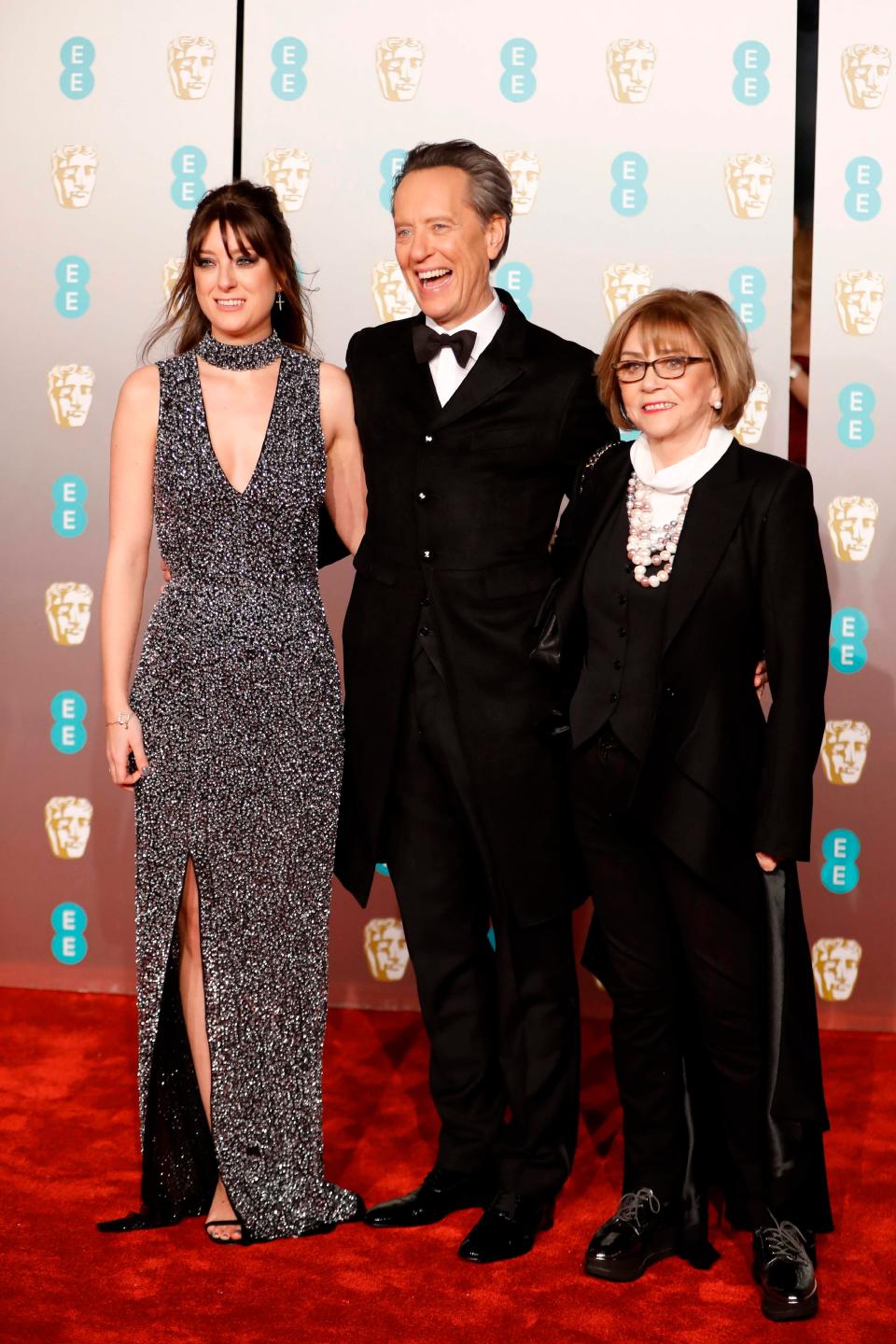How Richard E. Grant still finds 'A Pocketful of Happiness' after losing wife to cancer
"A Pocketful of Happiness" is our August pick for the USA TODAY Book Club. Author and actor Richard E. Grant will join us later in the month for a live YouTube conversation to discuss his book. Stay tuned for details.
Purchases you make through our links may earn us and our publishing partners a commission.
The term “soulmate” gets thrown around with abandon, often in the throes of young lust, long before love is tested by time, financial hardship, or even illness. But when Richard E. Grant calls his late wife Joan Washington his “soulmate” in his new memoir "A Pocketful of Happiness" (Simon & Schuster, 336 pp., out Tuesday), it almost seems an understatement.
“Could we love each other more? I don’t think that’s possible. We complete one another, like a pair of well-worn bookends, our lives in large volumes, bound together, in between,” the actor writes.
When Grant met Washington, a respected dialect coach 10 years his senior, they were both wounded – he by his parents’ divorce after infidelity, and she by her own divorce after infidelity. Grant writes that he hadn’t ever planned on getting married. Yet their love endured. They were married for 35 years, together for 38, with one daughter, Oilly, to whom the book is dedicated.
“If you place all your trust in another human being and it's reciprocated, that to me is like gold bullion in a marriage,” Grant tells USA TODAY. “And when your marriage goes through difficulties, which ours did like everybody’s does, that trust is the bedrock of it.”

The Oscar-nominated British actor (“Can You Ever Forgive Me?”) writes tenderly, heart on his sleeve, about his marriage to the diminutive-in-stature but mighty-in-spirit woman who died in September 2021 after being diagnosed with stage 4 lung cancer that had spread to her lymph nodes and brain. He describes their relationship as a 38-year-long conversation, one that he continues even now that she’s gone through shared letters and diary entries that seek to honor her dying edict: that Grant tries to find a pocketful of happiness in every single day.
What to know about Banned Book Club New app allows you to access books banned in your area
Famous friends, including King Charles, turned up to help
The more you get to know Washington as seen through Grant’s eyes, the more excruciating her terminal illness becomes. He shares it all, including the oft-hidden ugly details of terminal decline. But what emerges is a portrait of marital devotion as he prepares his ailing wife’s meals, portions out her pills, helps her bathe and paints her nails.
It’s also a stirring portrait of friendship. A decadeslong shared career in the arts made the couple many friends, and Grant recounts loving visits from luminaries like Emma Thompson, and Vanessa Redgrave and daughter Joely Richardson, who themselves suffered profound losses when Natasha Richardson, their daughter and sister, respectively, died at 45 after a skiing accident. Actor Gabriel Byrne stopped by for a visit when Washington’s hospital bed was delivered and he stuck around to help assemble it.

“I always thought of friendship being like a pyramid,” Grant says. “You’ve got your five beloved or your besties around the apex. And then you get further down, and you’ve got people that are more on the acquaintance level. And what’s extraordinary about terminal illness and then death and post-death is that during that time, people that maybe were further down that pyramid that you didn’t really think would come into close-up focus suddenly come through in a way that has been so hospitable, revelatory, loving. That has been astonishing.”
Also astonishing were the people who didn’t reach out. Grant writes of friends who’d been close enough to vacation with who kept their distance, some refusing to even acknowledge his wife’s illness.
“Ninety-nine percent of the people that we know loved, held and supported us beyond all measure,” Grant says. “But the 1% who didn’t, I’ll never speak to again.”
King Charles (who was then prince) was one of the friends who stepped up, paying Grant and Washington a house call as she neared the end. Grant writes of the future monarch showing up in a cream linen suit, carrying roses and a bag of mangoes, his wife’s favorite fruit. During the half-hour visit, he took Joan’s hand and said, “It’s been an absolute honor to have known you, Joan.”
“To which she quipped, ‘I’m still here!’ which made us all laugh,” Grant writes.
Richard E. Grant reveals director he's still dying to work with
“A Pocketful of Happiness” also serves as a kind of career retrospective, though the prolific actor who’s appeared in over 100 movies and TV shows could likely write a dozen without running out of material, thanks to the journals he’s kept for decades.
“It’s a way of making real what seems unreal because the odds of succeeding in my profession and the country I grew up in were so stacked. I kept being told it was an impossible dream,” said Grant, who was born and grew up in what is now Eswatini, a landlocked country in southern Africa between Mozambique and South Africa. “The fact that it’s played out and become a reality is still a sort of pinch-yourself moment. And I know that probably sounds disingenuous after I’ve been doing this for decades and I’ve met so many famous people and befriended so many people. But that wide-eyed in-wonderment feeling – I’m now 66 – has never gone away, and I now accept that it won’t go away.”
Grant is utterly sincere in his enthusiasm. He writes of weeping when he and costar Melissa McCarthy received Oscar nominations for their 2018 film "Can You Ever Forgive Me?” and he went viral for his fan worship of Barbra Streisand when he posted a smiling selfie in front of the gate of Streisand’s house along with a letter he wrote her when he was 14. It wasn’t until he was in his 60s Streisand would reply in a tweet: “Dear Richard What a wonderful letter you wrote me when u were 14 ! and look at u now! You're terrific in your latest movie with Melissa congratulations and love Barbra.”
As a lifelong fan of someone you’ll understand what it meant for me to take this snap outside the home of @BarbraStreisand Asked Security for permission & he replied ‘It’s a public road, but thanks for asking’ Wrote her this letter when I was 14. My wife is very understanding! pic.twitter.com/3SohXKpgZT
— Richard E. Grant (@RichardEGrant) January 29, 2019
“I’m grateful. I’ve never been blasé about it,” Grant says.
Even after over 100 projects – with parts in “Loki” and “Star Wars,” having worked with Robert Altman and Francis Ford Coppola – are there still artists with whom he dreams of collaborating? Grant’s answer is immediate.
“If you know Quentin Tarantino, can you please tell him there’s an English actor who wants to play a down-and-out, sleazy, past-his-sell-by-date lounge singer in a motel on the far edge of Las Vegas?” Grant says.
Tarantino, the ball’s in your court.
This article originally appeared on USA TODAY: Richard E. Grant looks for 'Pocketful of Happiness' after wife's death


